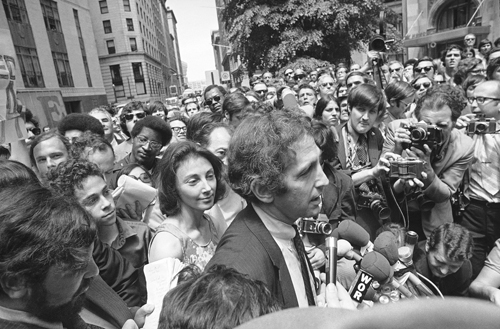
Most people know that in 1971 Daniel Ellsberg, an American military analyst who Henry Kissinger dubbed “the most dangerous man in America,” leaked the Pentagon Papers, an act that became one of the most decisive catalysts in ending the Vietnam War. But what many people don’t know is that Ellsberg’s decision to release the papers was, in part, a consequence of his conversations with the Zen Buddhist poet Gary Snyder in Japan more than a decade earlier.
Snyder and Ellsberg met for the first time in 1960 in Kyoto. Snyder was studying with the Rinzai master Oda Sesso Roshi, and Ellsberg was doing U.S. national security work for the RAND Corporation, a global policy organization. Though they talked about many things during their first meeting, perhaps what most impressed Ellsberg was that in Snyder he saw someone who “was in charge of his own life . . . a model of the way a life could be lived.” In 1970 Ellsberg traveled to Snyder’s home outside Nevada City, California, to thank him for his role in Ellsberg’s decision to release the Pentagon Papers. The following excerpt is taken from Ellsberg’s account of that meeting.
I introduced myself hastily, reminding him of our meeting ten years earlier; I realized that there was no great reason he would remember it. But he said that he remembered it very well; he was glad to see me again. He had liked me a lot, he told me later, though he didn’t agree with me and didn’t like what I was working for.
As we talked about the war over lunch, it got through to him that some changes had occurred, and the warmth he was already showing grew more intimate. Meanwhile, he was just about exactly the way I remembered him; I was still just as taken with him.
By the time we had to leave, I wanted to give him some indication of what I was doing now. I told him I was involved in an action that had to do with putting out information about the war, about secret decision-making and lies. It might be big, I said. But it probably meant that I would be put away for quite a while. (My indictment, the next year, posed a maximum sentence of 115 years.) I thought he would be interested to see the information when it came out; he agreed.
I didn’t show him any papers from the trunk, so as not to implicate him; but I hinted that he was implicated anyway, in the process of my awakening. I wanted to thank him.
Reprinted from “The First Two Times We Met,” from Gary Snyder: Dimensions of a Life, edited by Jon Halper © 1991. Reprinted with permission of Sierra Club Books.
Thank you for subscribing to Tricycle! As a nonprofit, we depend on readers like you to keep Buddhist teachings and practices widely available.